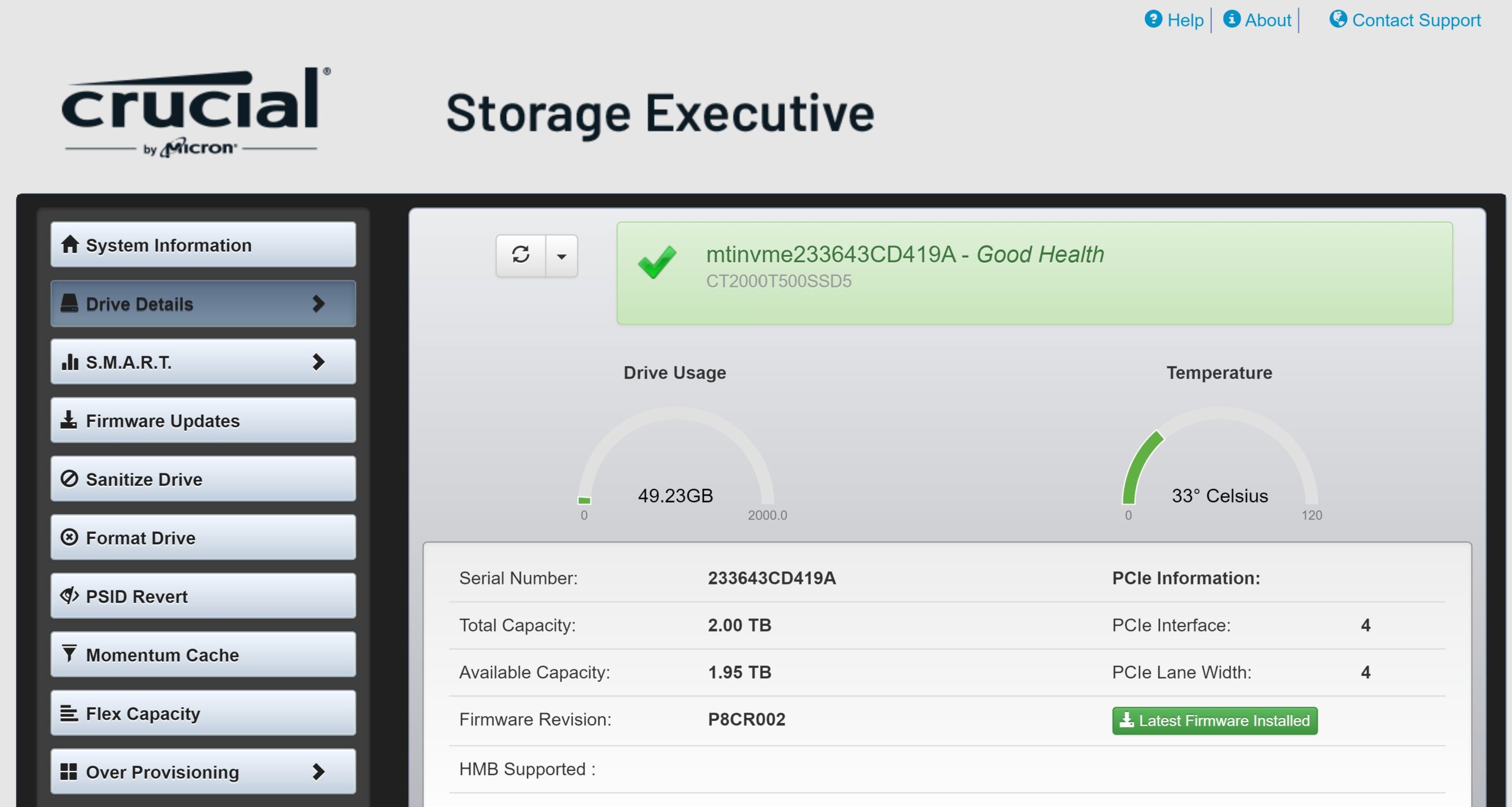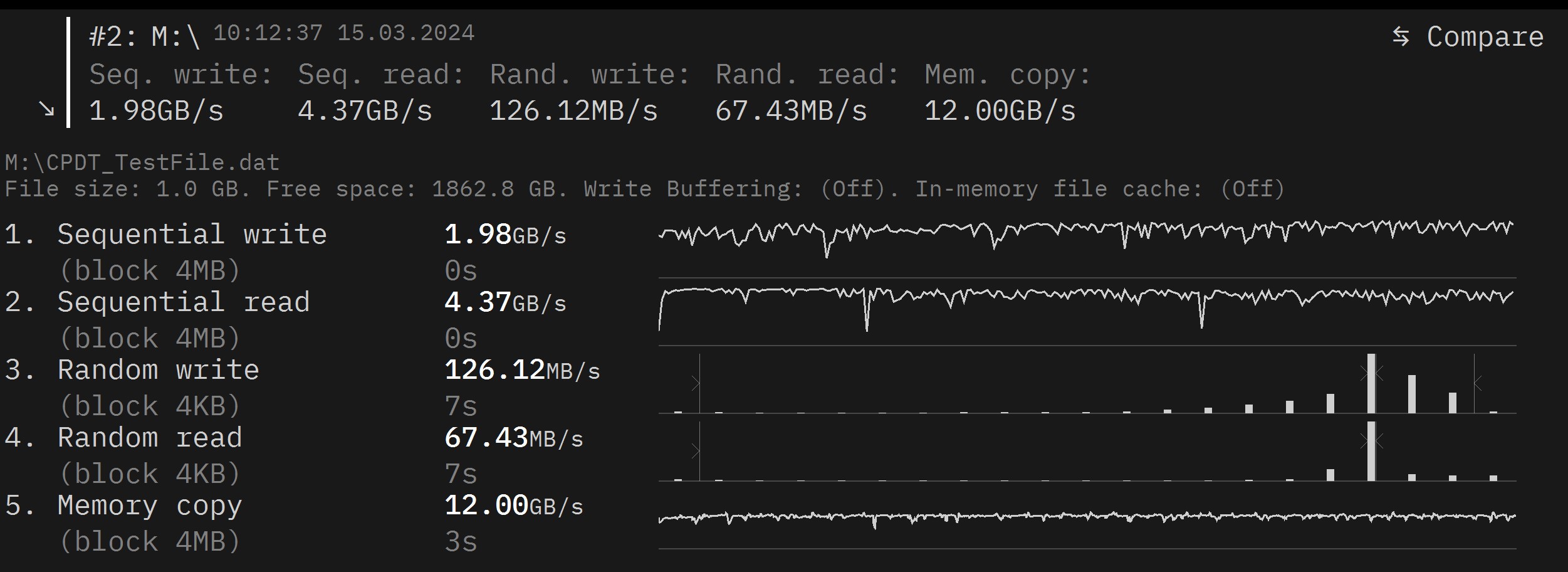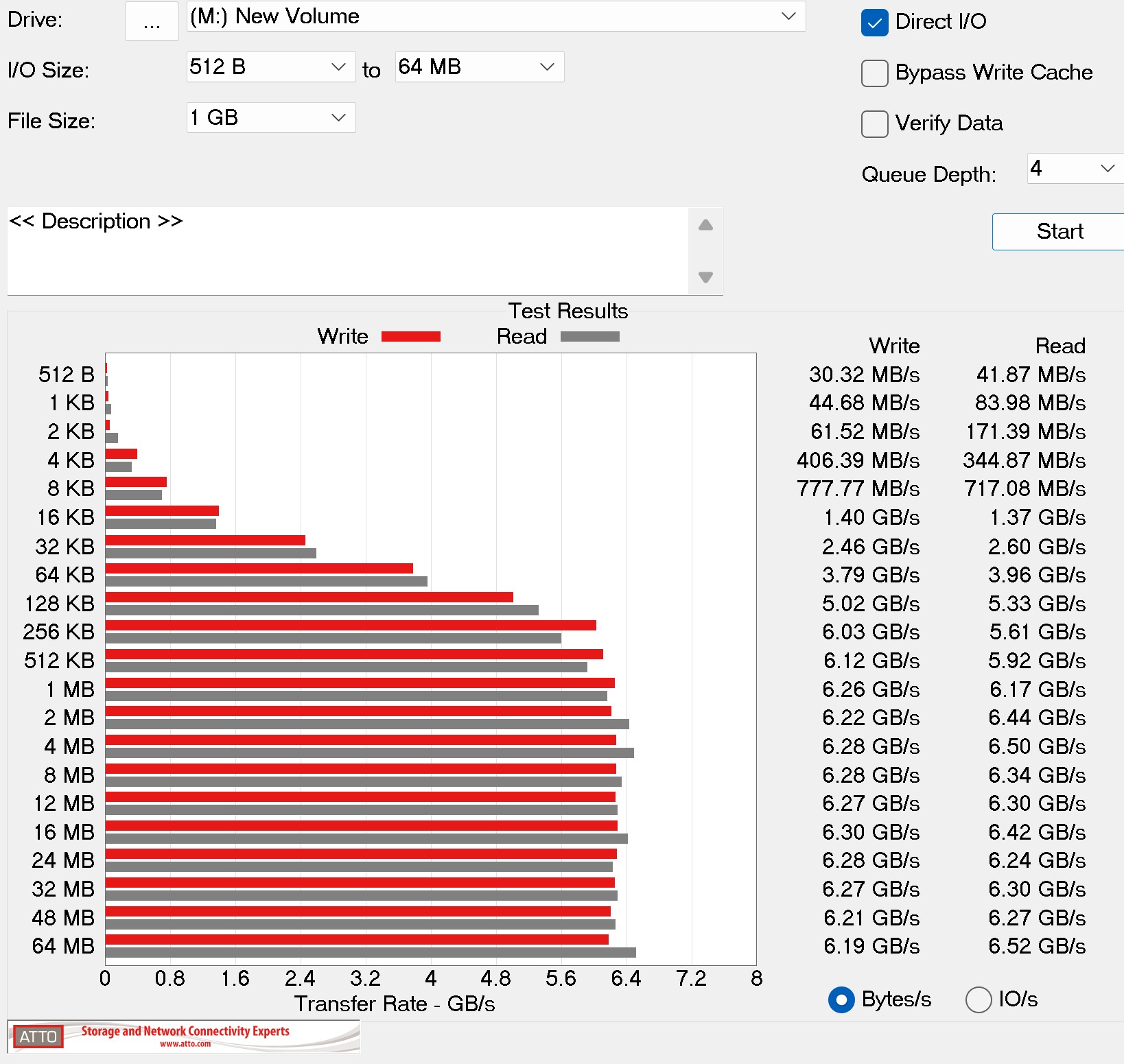The Crucial T500 SSD is its fastest PCIe NVME Gen 4 x4 and is perfect for high-performance gaming (PS5), photo and video editing and creators. It has an optional heatsink version.
Reviewing SSDs may seem mundane – the Crucial T500 SSD is anything but. It is a powerhouse, with sequential reads/writes reaching an impressive 7400/7000MBps. It maintains its speed even when handling larger file sizes with minimal cache degradation. We tested it with 32GB files and saw no significant speed drop-off. It is also appreciably faster at loading larger apps.
Our BlackMagic DaVinci tests showed a 30-40% speed increase in rendering a 4K@60Hz file. It supports Microsoft DirectStorage, which bypasses the Windows OS, letting the SSD communicate directly over the PCIe bus with the GPU. The benefits are lower latency, lower CPU/RAM loads, and faster data transfer.
CyberShack’s spoiler: It is easily the fastest PCIe Gen 4 x4 tested yet, and with the heatsink option, it is ideal for game consoles and small-form-factor PCs.
Australian Review: Crucial T500 SSD PCIe Gen 4 x4 NVME M2.2280
| Website | Product Page |
| Approx. Price (plus freight) | 500GB $100 or 20 cents per GB 1TB $140 or 14 cents per GB 2TB $260 or 13 cents per GB 4TB $TBA (coming later in 2024) |
| From | Specialist computer retailers |
| Warranty | 5 Years Limited Warranty or TBW (whichever comes first) |
| Made in | Malaysia |
| Owned by the memory maker Micron, Crucial is the finished RAM and SSD brand. Products include internal and external SATA and PCIe SSDs for laptops, PCs, and gaming-class memory. | |
| More | CyberShack storage news and reviews |
We use Fail (below expectations), Passable (meets low expectations), Pass (meets expectations), Pass+ (near Exceed but not class-leading) and Exceed (surpasses expectations or is the class leader) against many of the items below. You can click on most images for an enlargement.
Base Specs
- Phison E25 controller 2400 MT/s bus uses the full capability of the PCIe 4 x4 bus.
- Micron 232 Layer B58R 3D TLC NAND
- Standard (naked) and heatsink (low profile fits Sony PS5)
- 500GB, 1TB, 2TB (4TB model coming later in 2024)
- LPDDR4 cache (500GB for 500GB, 1GB for 1TB and 2GB for 2TB)
- Terabytes Written (TBW): 300/500GB, 600/1TB, and 1,200/2TB or a 5-year warranty (whichever is first). This is about the industry standard.
- TCG Opal security self-encrypted AES.
- Features: Static and Dynamic SLC caching, RAIN (redundant array of independent NAND), Multi-layer data integrity algorithms, Adaptive thermal protection, Data protection for power loss events, Active garbage collection, TRIM support, SMART, ECC, APST support.
- PCIe 4.0 x4, NVMe 2.0 (compatible with PCIe 5.0/3.0)


First Impression – Pass+
It is hard to be excited by an SSD, so let’s say that it comes well-packaged with a key for Acronis True Image disk cloning software for upgraders.
The 2TB review model has its new low-profile heatsink (a $10 option at purchase) and fits well in a Sony PS5. It also fits 99% of standard desktop cases and was tested in a NUC small format PC.
The excitement came when we tested it. It is very fast – advertised sequential read/write of 7400/7000MBps. Apps loaded faster, and large renders were 30-40% quicker.
Crucial Storage Executive – Pass
Allows users to manage the SSD, including monitoring real-time statuses, firmware updates, overprovisioning, and more.




Acronis True Image for drive cloning and data backups for upgraders (requires a device with two M.2 slots or an external USB M.2 dongle.
Test rig
Intel NUC 12 i7-2700H, 32GB DDR4-3200, 2x M.2 PCIe x4 Gen4 slots. This is a smallish format enclosure.

Speed – Exceed
It beats any other PCIe device tested to date. The closest are the WD Black SN850X and Samsung 990 Pro. Using a PCIe 5.0 bus actually increases speeds by about 10%.
Crystal Disk Mark is the peak data transfer rate. Note that it is perfect for large files.


CPDT shows the average sustained data transfer rate.


ATTO shows the effects of different file sizes (see cache below).


Cache – Pass+
Early reviews stated that the cache gave inconsistent sustained random (not sequential) write performance. Our tests with a 32GB Zip file show consistent performance, so we suspect any issues were resolved via a firmware update. However, the cache may be a bottleneck if you use larger files.

You can further increase cache performance if you have an uninterruptable power supply.
Temperature – Pass+
We had the 2TB heatsink model, which reached approximately 60° under 100% sustained load. It is designed to start throttling g at 80° or more, which is excellent. We understand that the non-heatsink model runs up to 80°. For most of the time, it sat around 45°.
CyberShack’s view – Crucial T500 SSD PCIe Gen 4 x4 NVME is the fastest tested to date.
It is not really the issue whether it is the fastest or all brands/models. It is the fastest we have tested and has an excellent price-per-GB ratio.
This is an excellent PCIe 4.0 x 4 SSD suitable for creators, gamers, image editors or anyone who wants to do disk-based work nearly twice as fast as PCIe 3.0 SSDs.
As it is backwards compatible with PCIe 3.0, consider buying this as it provides stunning 3500MBps read/write performance. It gets our buy recommendation.
Rating
- Features: 95 – I like the Phison family of controllers. This is the latest PCIe 4.0 x 4 supporting DRAM cache.
- Value: 95- Excellent value at comparable prices to older tech.
- Performance: 97.5 – best to date
- Ease of Use: 90 – Including Acronis True Image makes upgrades easy.
- Design: 90 – The low-profile heatsink model is only $10 more and would be my pick for any installation.
CyberShack Verdict
Crucial T500 SSD PCIe Gen 4 x4 NVME M2.2280
500GB/$100, 1TB/$140 and 2TB/260 plus $10 heatsink










Comments